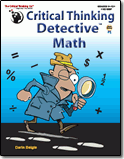- Bargain Bin: Clearance or Used
- Discontinued or Limited Quantities
- Used - Singapore Primary Math Common Core Editions
- Advanced Mathematics
- Art & Music
- Christian Curriculum
- Educational CDs & Videos
- Educational Games
- Educational Puzzles
- Foreign Language
- General Curriculum
- General Mathematics
- Geography
- Government & Economics
- History
- Homeschool Helps
- Language Arts
- Lesson Planners & Records
- Logic & Critical Thinking
- Phonics & Reading
- Preschool
- Reading & Literature
- Reference
- Science
- Social Emotional and Character Development
- Special Needs
- Test Prep
- Unit Studies
- Home
- Logic & Critical Thinking
- Critical Thinking Detective™ – Math
Critical Thinking Detective™ – Math

Regular price
$10.99
Sale
Vendor:A Brighter Child Homeschool & Educational Supplies
SKU:3837
Categories: Logic & Critical Thinking
Tags: Religious:no
These popular, easy-to-use detective cases are suitable for Grades 6 – 12+. Students must apply critical reading, critical thinking, and mathematical reasoning. The mathematics needed to solve these cases require the application of common middle school math concepts, but don’t be fooled! The real challenges are to first identify the clues by synthesizing from different witnesses and suspects, and then determine the necessary math needed to turn the clues into evidence.
Some cases may be more challenging for younger students, but teachers and parents can always use the optional hints provided to help students that reach a dead end. The cases also develop observation skills, reading comprehension, and deductive and inductive thinking skills. Learning to identify and evaluate evidence is the very heart of critical thinking.
48 pages. Grades 6-12.
From The Critical Thinking Company.
These popular, easy-to-use detective cases are suitable for Grades 6 – 12+. Students must apply critical reading, critical thinking, and mathematical reasoning. The mathematics needed to solve these cases require the application of common middle school math concepts, but don’t be fooled! The real challenges are to first identify the clues by synthesizing from different witnesses and suspects, and then determine the necessary math needed to turn the clues into evidence.Some cases may be more challenging for younger students, but teachers and parents can always use the optional hints provided to help students that reach a dead end. The cases also develop observation skills, reading comprehension, and deductive and inductive thinking skills. Learning to identify and evaluate evidence is the very heart of critical thinking.












